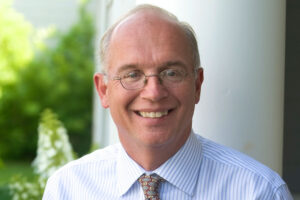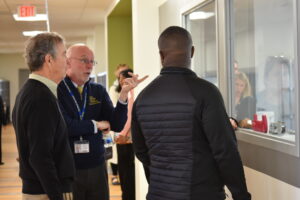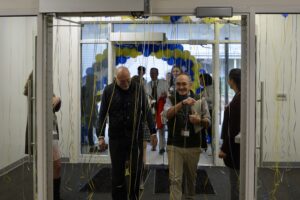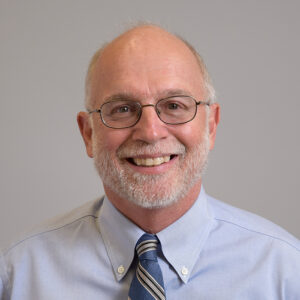Chris Garten

In the fall of 2008, I came to campus for the first time for a weekend interview. It was this gorgeous autumn afternoon. Bright, streaming sunshine. Crisp fall weather. And in the interstices between my interviews, I asked if I could wander around the campus. I was struck almost instantly — especially since I had been visiting schools all over the country — by the warm, open feel of the campus and how friendly and welcoming people were. I went on the sideline of a soccer game, and people didn’t know who I was but in a kind of charmingly Midwestern fashion, people just came up to me, introduced themselves, asked me who I was, and then almost spontaneously, they shared their excitement about the school and about their kids’ experience.
I don’t think I ever forgot my first impressions of Seven Hills. Ours is an equally engaging and rigorous curriculum as any school in the country, but there’s also a kind of modesty and sense of balance about the way that the school operates. It’s a matter of feel. Fundamentally, you can see yourself and feel yourself as part of the community.

In numerical terms and quantitative terms, the school is a very different school than when I started. We have a radically different campus footprint. We are much more diverse — probably almost three times as diverse in terms of socioeconomic and racial diversity. Kids are growing up now in a society that’s much more pluralistic — their work experience, their life experience is going to throw them together with collaborators and employees and friends and family from a much wider array of backgrounds, so we’ve tried to make sure that what kids read and study helps them develop a cultural competence.
The demography, beyond ethnicity, has changed, too. When I started here 14 years ago, we weren’t a majority community of two-income parents, and now the vast majority of our families are two-income families. So that has changed the expectation for what a school can provide. We have a 2-year-old program and a robust summer program and 7 a.m. to 6 p.m. days for kids. I’m proud of all that, but what I’m most proud of is how the programmatic offerings of this school have evolved over my time to try to dovetail more with the needs of young people today. What great schools like this do is take the pulse of the world and evolve their program to try to provide experiences which prepare kids for positions of leadership in the world as it actually exists or the world as it will exist when they enter it.

We made a major investment early in my tenure in faculty training and curriculum development. It wasn’t really perceived as a weakness and yet, bluntly, in quantitative terms relative to national benchmarks, we were probably allocating a third as much resources to that area, and we made a major push to triple the size of the faculty training budget. We call them Summer Curriculum Development grants, which incentivize teachers who have ideas percolating but never had the time or the energy to develop them. These are modest amounts of money, but I think it’s been the crucible for the continuing evolution of the school’s program. We probably award 40 of these grants every summer so, in the time I’ve been here, close to 500 now. We’ve developed a process to undergird and to nurture faculty creativity.
Two strategic plans have occurred on my watch, which articulated the importance of global awareness and civic engagement; diversity, equity, and inclusion; and STEM offerings. The thing that gets less attention but arguably is even more important is a focus on the social and emotional development of young people. We’ve made a much more self-conscious effort to build out guidance programs to provide really explicit training in things like how to develop a relationship, how to start a conversation, how to deal with a conflict with somebody.
It’s part of an effort to help kids create balance in their lives. Yes, this is a challenging and rigorous academic institution, and yes, it asks kids to aspire and prepare for the most demanding colleges and universities in the country, but I think fundamentally what we’ve not taken our eye off of is the whole breadth of the human experience. Our mission statement is defined pretty ambitiously. We’re not just a college preparatory school. We believe that it’s our responsibility to prepare kids for life, in all of its aspects. The faculty, as much as they want to challenge kids and prepare them academically, they also want to prepare them to be able to take care of themselves. It’s a marathon, not a sprint.

This job evokes that old saw, “Man plans and God laughs.” My days begin with a series of meetings or a list of things that I hope to accomplish, and then life gets in the way. But there are still a lot of days when I have time to wander around the campus and visit classrooms. Particularly, because I didn’t grow up teaching kids this age, I spend a lot of time in elementary school classrooms. It gives me the biggest charge how unabashed kids are about sharing what they’re learning.
I usually enter a classroom unannounced, greet the teacher, and try to give them a sort of inquisitive look to make sure that I’m not arriving at a time when they don’t want me there. For the most part, I try to restrain my impulse to participate. I’m fascinated by how much interest very young kids expect you to take in the minutia of their lives. I’ll go into a classroom at snack time, and if one child shares something with you, all the others in the group feel that they need to share something on that same topic. There’s this charming openness to life. These kids are so lucky to be surrounded by adults who love them and care about them, and they don’t see rank.
I’ve certainly learned in my years at Seven Hills about what the teachers of young children do. Basically, the miracle is that they are preparing kids in all kinds of ways to be learners in a way that I just didn’t fully get before. I’d never taught a child younger than fifth grade. Having the kind of habits of mind and self-discipline and flexibility and attention span that makes learning possible — that’s what the school’s amazing teachers of young children do.

I love the milestone moments in kids’ lives. I’m a sucker for graduation ceremonies and moving up ceremonies because life is crazy busy, and how often do you get to stand back and see the arc of someone’s life? The kids who are graduating now were kindergartners when I started. So, I’ve known them, some of them, through the whole arc of their life. I’m also a big sucker for what educational theorists call “demonstrations of learning,” those moments when there’s a culminating project. I think maybe the purest distillation of this is arts productions. I love to go to Middle School concerts, where the kids have been playing the saxophone for three months. They just take such pride in what is fundamentally a collaborative enterprise. They’ve all learned how to do this thing together, and they are all palpably excited by what they can now do that they couldn’t do three months ago.
I was at a gathering of teachers who teach in different divisions recently, and one of the faculty members who has been here a long time shared that they’d gotten a letter from a recent alum updating the teacher on what he was doing. It prompted this discussion in the faculty workroom about all of their collective memories of that student. It was somebody who’d had a real struggle in elementary school, academically and socially and behaviorally. The school had done all kinds of interventions with the family and surrounded the child with support, and what I came away with — if you extrapolate that one conversation out — is what a tremendous sense of pride teachers here take in how their collective efforts have altered the arc of students’ lives.

Some families might think the school dines out on its AP scores or its SAT scores or its college placement list. It’s actually weirdly the opposite. It seems to me that the greatest source of pride is kids who didn’t start with huge amounts of ability. In unvarnished moments, when teachers are sitting in a room together talking about kids, what they stressed was their pride in kids where frankly the teachers worried if the student would graduate from the school, and the student ended up not only graduating but also excelling in the world. It’s the kind of thing that doesn’t show up on the list of best schools in the country that use only measurable indices, but that’s what makes Seven Hills Seven Hills.

